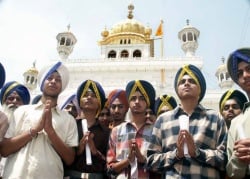International Turban Day
International Turban Day was started in 2004 to bring awareness of the strict requirement on Sikhs to don the turban as a mandatory part of their religion. Since 9/11 in 2001, the turban has attracted negative attention due to the wrongful linking of this garment with Osama bin Laden, who is a Muslim. Due to the vast news coverage of Osama bin Laden following 9/11, everyone wearing a turban was looked upon as part of his clan or sect and considered to be Muslims. Despite this wrong perception, the vast majority of people who wear turbans in Western countries are actually Sikhs.
The turban or "pagri" often shortened to "pag" or "dastar" are different words in various dialect for the same article. All these words refer to the garment worn by both men and women to cover their heads. It is a headdress consisting of a long scarf-like single piece of cloth wound round the head or sometimes an inner "hat" or patka. Traditionally in India, the turban was only worn by men of high status in society; men of low status or of lower castes were not allowed or could not afford to wear a turban.
Although the keeping of unshorn hair was mandated by Guru Gobind Singh as one of the Five Ks or five articles of faith, it has long been closely associated with Sikhism since the very beginning of Sikhi in 1469. Sikhism is the only religion in the world in which wearing a turban is mandatory for all adult males.
In the news
bbc.co.uk
Sikhs urged to support Turban Day
A Sikh organisation in northern India has called on all Sikhs to observe 13 April as "World Turban Day".
The Shiromani Gurudwara Prabandhak Committee (SGPC) said the purpose of the day was to improve international awareness of Sikhism.
It believes that distrust and aggression against Sikhs is caused by a general ignorance about the religion. Sikh men have been mistaken for Islamic fundamentalists since the 11 September 2001 attacks on the US.
There has been more than one instance where US-based Sikhs have been attacked and even killed.
SGPC secretary Manjit Singh Calcutta told the BBC the idea for the day was mooted as a way to try to tackle the suspicion and hatred directed against turban-wearing Sikhs living abroad.
French ban
Mr Calcutta also said the recent decision by the French government to ban the wearing of religious symbols, including turbans, came from ignorance about Sikh religious customs and traditions.
He said Sikhs living abroad could celebrate World Turban Day by initiating local campaigns to inform other communities about Sikhism.
He said the significance a turban has in their religion should be emphasised.
He asked all Sikhs to don traditional hand-tied turbans on this day rather than the more casual under-turbans and half-turbans.
13 April was selected as Turban Day because it is also the eve of the Sikh festival of Baisakhi that marks the birth of modern Sikhism or the Khalsa.
In the northern Indian state of Punjab, where Sikhs are in a majority, the Baisakhi festival also signals the start of the harvest season and is in general a time of much joy and merry-making.
sikhnn.com
Amritsar, Punjab, India -- Young Sikhs stand outside the Akal Takht after doing Ardas to mark April 13 as "World Turban Day" - declared by the Shiromani Gurdwara Parbandhak Committee (SGPC).
The SGPC said that Sikhs have been targets because of general ignorance about their religion. Since 9/11, Sikhs have experienced a spike in the number of hate crimes in the United States and Europe. Sikhs have also been caught in the middle of a French law banning religious headwear, originaly targeting Muslim women. The pracitice seems to be spreading in other countries in Europe.
SGPC secretary Manjit Singh Calcutta told the BBC the idea for the day was mooted as a way to try to tackle the suspicion and hatred directed against turban-wearing Sikhs living abroad.
In Amritsar, SGPC volunteers tied religious bands on the turban-wearing devotees entering the Golden Temple.
Sikhs in India have observed World Turban Day in an effort to raise awareness that Muslims are not the only people to wear a headdress as a religious duty.
Sikhs were attacked, and some killed, in the US after being mistaken for Islamic fundamentalists after the September 11 attacks.
Tuesday was chosen as Turban Day because April 13 coincides with Baisakhi, the festival marking the formal establishment of Sikhism in 1699 by Gobind Singh, the last of its 10 gurus.
For Sikhs the turban and the kesh, or uncut hair beneath it, symbolise love and obedience to the wishes of the religion's founders more than 500 years ago.
Sikhism was founded in the 15th century by the visionary peasant Nanak Bedi as a caste-less religion preaching equality.

